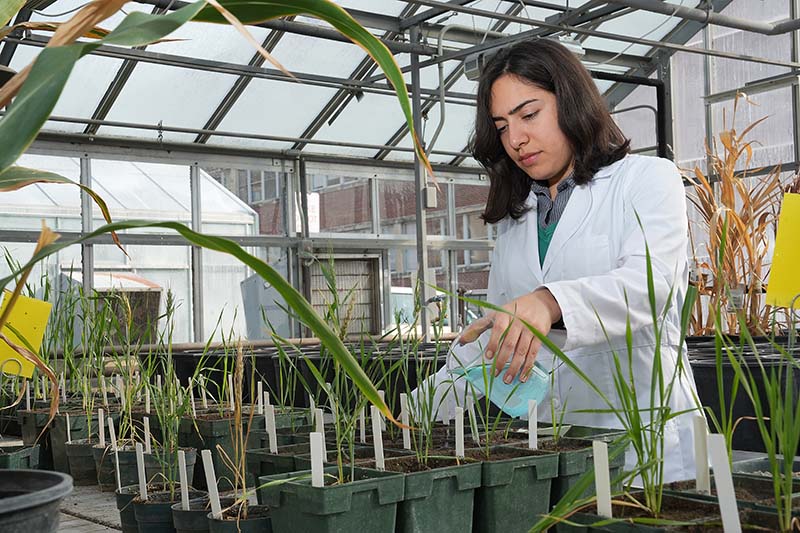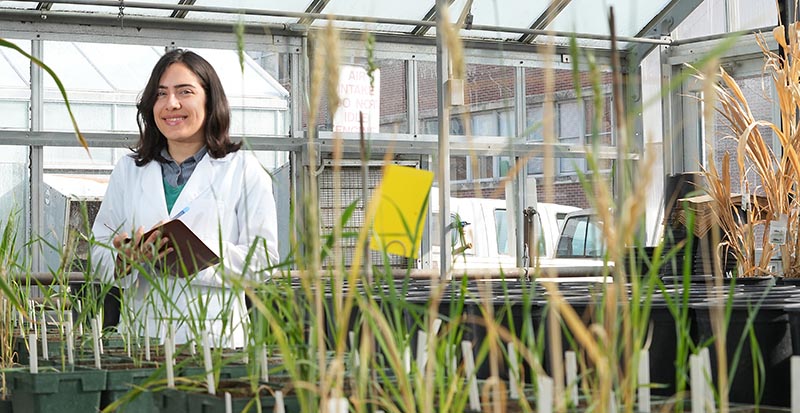Maliheh Shaltouki Rizi - Graduate Ag Research Spotlight
I have always believed that big change starts with small steps. This motivates me to find answers to questions that would lead to a better life for humans.
- Maliheh Shaltouki Rizi, PhD student, Department of Agronomy
The student
When Maliheh “Mali” Shaltouki Rizi describes the ancient Iranian city of Esfahan, she notes its beauty and historical monuments. Growing up there, she was also aware of the importance of agriculture surrounding the metropolitan area because her grandfather farms rice, a popular crop in the region. “My interest in agronomy may arise there,” she says. “I see the farmers that sometimes struggle with different challenges on their farms. If I could help them, they would definitely have better lives.” This interest took her first to Qazvin International University, where her major in medicinal and aromatic plants introduced her to plant breeding and genetics. She then earned a master’s degree at the University of Tehran, where she studied the physiology and breeding of medicinal plants like mint and thyme. While the university is highly selective, it draws primarily Iranian students. “I wanted more experiences to have exposure to diversity,” Rizi says. “To meet other people from other countries could broaden my horizons. I decided to apply to universities in the U.S and specifically Purdue because it is prestigious in agriculture.” She arrived at Purdue in January 2022 to begin doctoral studies with Mohsen Mohammadi, associate professor of agronomy. “From when I started my program, I could reach out to him for advice,” Rizi says of her advisor. “He is a good mentor.”
THE RESEARCH
Rizi’s research focuses on improving wheat root traits to increase the crop’s resilience in different environmental conditions. “Our aim is to develop high-yielding wheat varieties with root characteristics that increase yields,” she explains. Specifically, Rizi uses genomic and phenotyping tools, and bioinformatics approaches to identify quantitative trait loci (QTLs) and find target genes that control these traits. Rizi says that Purdue’s Ag Alumni Seed Phenotyping Facility has been especially useful in her work. Working in biotechnology involves repeating experiments many times, she says: “Sometimes it doesn’t work. Troubleshooting using my creativity motivates me.”
opportunities
Rizi was named a George Washington Carver Scholar at a conference of the National Association of Plant Breeders, an award that provides her with a mentor from industry. “My advisor and department provided me this opportunity to attend the conference, and I really appreciate it,” she says. Her research has led to one published article and a second manuscript submission. Rizi has also honed her leadership and communication skills as public relations chair for agronomy’s graduate student organization and as an officer with Purdue’s Iranian Cultural Club.
future plans
Rizi expects to complete her degree in 2025 and hopes to work in plant breeding and research for a large agriculture company where “I can turn scientific discoveries into practical applications to benefit farmers and society,” she says. “Because U.S. companies have more cutting-edge research, I prefer to start in a U.S. company and then will be open to developing countries.” In her spare time, Rizi enjoys tennis and hiking, reading books about psychology and watching movies.





